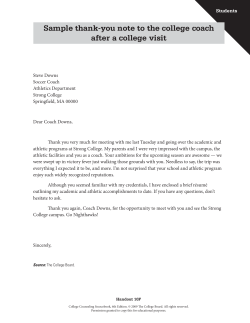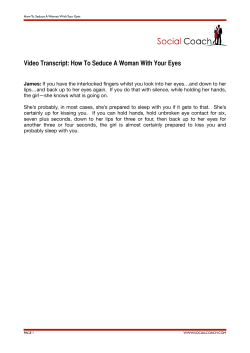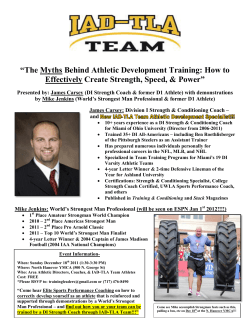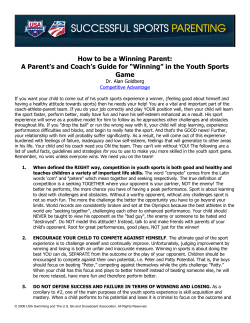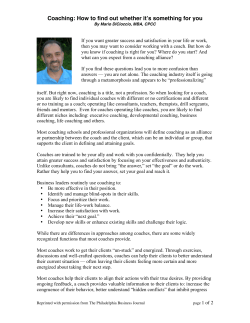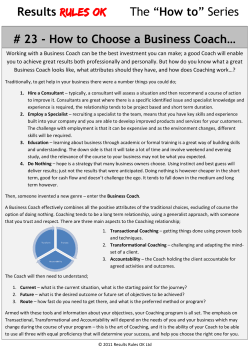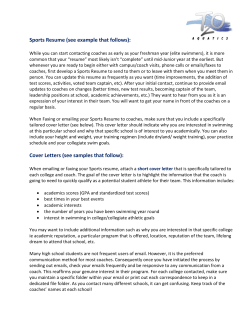
WHAT IS THE MEANING OF SPORT COACHING? (Expectations, possibilities, realities)
Szabo, A.S.: WHAT IS THE MEANING OF SPORT COACHING? Sport SPA Vol. 9, Issue2: 39-44 WHAT IS THE MEANING OF SPORT COACHING? (Expectations, possibilities, realities) Andras S. Szabo Corvinus University of Budapest, Hungary Professional paper Abstract In the paper information is given about important parameters, concerning the role of the coach. Special attention is paid to 10 different topics: physical and mental abilities, transfer of the knowledge, ability to manage different age groups, pedagogy, support the athletes, ready to help, motivation, outlook, behaviour. 2 dominant themes will be also briefly analysed: the main requirement from the coach (charismatic personality) and the main aim of the coaching activity (to educate healthy, stabile and happy human beings). Key-words: abilities, behaviour, characteristics, pedagogy, role of the coach INTRODUCTION the philosophy of the coach in a concrete case is always individual and depends on his/her own In this paper I am going to answer the question: what is the meaning of sport coaching? Or, in other words to find a reply to the question: what is the role of the sport coach? In the previous issues of Sport Scientific and Practical Aspects Journal there were some articles, analysing this problem. Information was given about the role of the coach as a leader (Huseinagic and Hodzic, 2009) and as a decision maker (Huseinagic and Hodzic, 2010). I try to pay attention to 10 different, but important and necessary parameters, characterizing and determining the activity and success/failure of the sport coaches. personality (Frank, 2002). The coaches different, and the character traits of dominant types determine the behaviour attitude of a coach. The major types of coaches are the following (Feher, 2006): are the and the - democratic - liberal - autocratic The democratic type of coach creates the best development of successful coach-competitor collaboration. During the coaching activity the trainer involves the athlete – to certain extent into the decisions. The democratic type has the most positive, athlete-centric attitude. Naturally the democratic coaching behaviour should not be in contradiction with the requirement of disciplinary actions or with justified punishments. Of course the incorrect (antisocial) behaviour of the athlete should always have consequences. Everebody knows, that not every outstanding competitor becomes a successful coach, whereas the best coaches of the world were not necessarily elite competitors. Many famous athletes, having world class performance as competitors, failed as coaches. Can these failures be explained by personal insufficiency of the coaches? Partly yes, because insufficient personal or professional chracters, under qualification, lack of self-education, experimenting inclination may have been the real reasons behind the failure. The liberal coach is often called permitting type or even non-interfering type. The liberal coach defines the training tasks only roughly, in some cases in a passive way, giving substancial freedom to the athletes. His/her instructions are weak and incomplete, the controling activity is inconsistent and weak. There is no constructive collaboration between the coach and the competitors. How to define the activity or the role of the sport coaches? Coaching is not easy to define. Coaching develops people through improving their performance (Criesfield et al., 2005) The role of the sport coach can be the following(www.topendsports.com): to create the right conditions for learning to happen and to find ways of motivating the athletes. Although the general coaching philosophy is based on several generally valid positive human values, but The autocratic coach demands respect in a dictatorial way, characteristically directs the trainings by orders during which the athletes are not involved into the decisions. This type of 39 www.sportspa.com.ba Szabo, A.S.: WHAT IS THE MEANING OF SPORT COACHING? Sport SPA Vol. 9, Issue2: 39-44 coach does not require cooperation, he/she determines alone the training objectives, which should be executed by the athletes. The autocratic coach is motivated to achieve the targeted objective by all means. He/she is seldom interested in the personal problems of the competitors. peculiarities (Szabo, 2012). Combination – in different ratios – of the previously mentioned 3 types of human character. But the goal is to be closer and closer to the ideal one, so I sincerely hope that this work can help a little also in improvement and development of the coaches, and also in the self-approciation. Let me mention finally that – although I am a specialist in the field of olympic weightlifting - this paper is written of course not only for weightlifting coaches, but I do hope that the general establishments and conclusions should be valid for all other coaches in other sport disciplines, as well. Conducting a lot of IOC coaching courses in the last years in olympic weightlifting, I tried to give for the participants (coaches, athletes, sport federation administrators) rather detailed information about the role of the sport coach. This was because of the fact, that the coaches were really interested in this significant topic, having a lot of questions and comments concerning this important field of training management and coaching activity. The main requirement, concerning the role of the sport coach In the following I am going to analyse shortly 10 different parameters, which are rather important if we would like to characterise the role of the sport coach in the process of training, teaching and education. But there is – to my mind – a really important, highly dominant factor, which is absolutely essential and typical for the good and successful coach. This is the ability to have a strong impact on the audience, on the competitors, players, on the sport team. With other words the coach has to have a charismatic personality! If the coach does not have this peculiarity, he/she will be never really accepted and acknowledged by the athletes and sport teams. Of cours the coaches should always consider their own and competitors (athletes, players) limits! So, let us see the chosen 10 important parameters! Let me give a short survey about it, trying to fulfil the demand of coaches in different countries, who asked me to have this material not only as an oral lecture but in written form, as well. This written material is based of course mainly (but not solely) on my own experience. But in the same time I tried to take into consideration a lot of published and available scientific material and the conclusions and results of earlier discussions with many leading sport specialists and coaches (e.g. I. Abadjiev, A. Avsetov, T. Ajan, F. Antalovits, P. Baczako, W. Baszanowki, L. Baroga, D. Cioroslan, J. Hanzlik, G. Hiskia, J. Horvath, I. Johansson, L. Jones, A. Kulesza, Yu. V. Masloboyev, A.S. Medvedev, L. Mocsai, L. Nadori, P. Nemeth, A. Orvos, H. Roewer, E. Rosario, Yu. Sandalov, G. Schodl, A. Spassov, A. Stark, Gy. Szalay, G. Toth, E. Zanetti, I. Zsuga) in weightlifting and in other sports, as well. Of course we should take into consideration, that the role of the coach will change over the time an athlete spends with the coach (Pensgaard, Roberts, 2002)(www.brianmak.co.uk): - when an athlete first starts in a sport (cognitive stage), the main role is telling or showing coaching style - as the athlete develops (associative stage) the coach and athlete discuss appropriate training requirements (involving coaching style) - as the athletes matures (autonomous stage) the role of the coach is dominantly a mentor, providing support and advice 1. Physical abilities The good coach is sometimes a demonstrator, as well. If necessary the coach should be able to show how to make e.g. a power jerk, a deep snatch or a dynamic shotput. If the coach is fit and was a former competitor (it is not necessary to be a former top athlete) it is not too difficult to fulfil this simple requirement. But coaching without own experience as a competitor – it is really difficult, almost impossible. How to speak about the technique of butterfly stroke swimming if the coach can not swim? How to speak about the biomechanics of weightlifting if the coach can not perform a back squat exercise? 2. Knowledge (mental abilities) In this paper I am going to write about the requirements concerning the characteristics of excellent coaches. Of course we do not have ideal coaches (only positive parameters), the coaches are always real human beings, having a combination of positive and negative The knowledge of the coach has to have 3 fundaments: 40 www.sportspa.com.ba Szabo, A.S.: WHAT IS THE MEANING OF SPORT COACHING? - - Sport SPA Vol. 9, Issue2: 39-44 special knowledge (detailed information e.g. about track and field sport) general sport knowledge (e.g. biomechanics, sport physiology, sport psychology) general knowledge about human culture (history, geography, arts, science etc.) the selected teams (e.g. adult top athletes) will work later with beginners. This is completely other matrix, other requirement, and therefore we need completely other management, behaviour, treatment, as well! A good coach is in the same time a good psychologist, having the capability to understand the athletes belonging to different age groups. Of course the coach must not only understand but also successfully manage the competitors of different age! And not only during the training, but in stressful conditions (e.g. competition situation, after defeat), as well. The coach should be a homo sapiens and a homo faber, but sometimes homo ludens, as well. He/she has to have a high level of individualization, concerning the treatment, as a function of age of the athletes. Of course nobody is perfect, nobody knows everything, there are no universal coaches. But a good coach has to have a necessary level of knowledge in all these 3 fundaments. 3. Ability to transfer the knowledge A good coach has the ability to transfer his/her knowledge to the pupils, to the athletes. It means the coach has to have the communication skill, voice, enthusiasm, even sence of humour. The explanations should be always true and useful, but also interesting and not too long. Not only silent demonstration is necessary, but demonstration with instruction (verbal information) using voice with appropriate speed and volume. 5. Pedagogy The coach is a teacher, the coach is an educator, he/she has to be a good specialist in pegagogy. He/she has to show a good pattern for the competitors, having discussions sometimes not only about sport, but real life, problems, school, family, social situations, etc. In other words, the coach has to be a good pedagogue, having also the capability to handle conflicts. In case of teaching young athletes, beginners the use of anatomical terms, scientific language and other technical terms should be avoided, keeping description brief is important. E.g. if we teach the movement „press from behind the neck” a description such as following should be definitely avoided (Jones at al., 2010): 6. To support the athletes, CCP The coach is a supporter, helper, partner of the athletes. As a function of the age-difference between the athlete and the coach, he/she can be for the athlete a secondary grandfather /grandmother, a secondary father/mother or secondary brother/sister. The good coach is always a partner and a real friend. In industrial processing from point of view of quality and safety we use often the abbreviation CCP, which means critical control point. In sport CCP is also very important, but it means coach and competitor partnership. Yes, indeed the coaches and athletes are partners, sharing happiness together in case of success, but being partners and having common responsibility in case of failure, as well. I am sure, everybody knows the saying: a friend in need is a friend indeed. This is of course valid for the coach, as well: a coach in need is a coach indeed. „This progressive resistance exercise is termed the press from behind the neck. It stimulates development of the deltoids, trapezius and the outer head of the triceps. We are learning it not only as a method of increasing the force production and hypertrophy of these muscle groups, but also as a method of ensuring strength and confidence in the receiving position in the second phase of the second classical lift.” This explanation is good on the conference, concerning biomechanics, anatomy or exercisepyhsiology or on coaching seminar for specialists in lifting, but not good for beginners. Sufficient information can be given by saying: „This lift is called the press from behind the neck. It strengthens the arms and shoulders for the jerk.” 7. Ready to help 4. Ability to manage different age groups The activity of the coach is mainly performed during the training time, but not exclusively. He/she should be always ready to help for the athletes, if necessary. To be a good coach means he/she is always ready to help. 24 hours readyness/day and 365 days readyness/year. There are coaches who are specialized for young athletes (e.g. in swimming even for kids!), and others for adults for a rather long period. But sometimes they have a change, and coaches of 41 www.sportspa.com.ba Szabo, A.S.: WHAT IS THE MEANING OF SPORT COACHING? Sport SPA Vol. 9, Issue2: 39-44 8. Motivation to manage different people, because he/she has the knowledge and competence to perform it. A good coach is motivated. The motivation can be based on moral and material acknowledgement. Both are necessary. Without stabile (acceptable) financial background the coach is not in the position to do his/her best as a coach for the athletes. Of course the success or failure depends not only on the coaches, but the athletes, the players, as well. Every human being – as an individual person – needs a different treatment, the level of cooperation is a function of the character and the emotional type of the coaches and the athletes. In some cases this process – collaboration between the coach and the competitor – is without problems, in other cases it is extremly difficult. 9. Outlook, appearance Do not think, that this parameter is negligable. The coach should be handsome, good-looking, nice, charming, having good appearance and a necessary level of personal hygiene. An uncaredfor coach is a very bad pattern for the young athletes. Good health, healthy lifestyle, refusal of harmful habits are also important expectations. Smoking, alcohol-dependence, drugdependence or e.g. a very big stomach, obesity is also not the pattern, what the competitors have to copy. Independently from the emotional type the coach belongs to, he/she has to be always frank, objective, disciplined, having true evaluation of the training and competition situtations. And a good coach has the necessary sensitivity to the problems of the athletes, he/she never refuses, never rejects them. The coach has to work with high level of responsibility. Knowledge and right behaviour together means intelligence. Intelligent athletes need intelligent coaches. 10. Behaviour This peculiarity can be evaluated as one of the most important ones. This parameter, this pattern will have definitely a strong influence on the competitors from the beginning on. Is the coach angry or patient, kind or rigid, quiet or loud, polite or impolite, pleasant or unpleasant, what is the level of assertivity and agressivity, what about self-confidence and self-knowledge, etc. these are really important effects on the athletes from the part of the coach. The emotional background is dominant in every case. Some additional remarks In this article I made an attempt to analyse briefly some important parameters of a good sport coach. It is of course possible that other coaches, other specialists have other opinion or they would be able to mention other important peculiarities, as well. E.g. Dragomir Cioroslan – having an excellent lecture at the 2007 IWF Symposium in Rome, Italy – mentioned, that in our days, in the market-oriented society the coaches should be able also to bring money to the clubs, having contacts with sponsors, even actively participate in fulfilment of invitations for tenders, etc. (Cioroslan, 2007). It is wellknown that Hyppocrates (a greek physician of ancient times) differentiated 4 groups of human beings, based on their emotions: - - Anyway, the role of the coach is important and the work of the sport coach is rather difficult. We can say, that a good coach is for the present, but a great coach is also for the future. A great coach is sensitive to the newest achievements of the science and technology, he/she is ready to apply these up-to-date knowledge in the everyday practical training, as well. choleric type (active, agressive, sensitive, impulsive, optimistic, strong emotions) sanguine type (friendly, communicative, changeable, easy behaviour, weak emotions) melancolic type (pessimistic, closed, quiet, stabile, serious, realistic, strong emotions) flegmatic type (passive, not changeable, peaceful, well controled, balanced, cold, low level of emotions) A really good coach is able to answer the question not only how, but the question why, as well. (KNOW HOW and KNOW WHY). The difference between the normal and the excellent coach is like the difference in the industry between the technician and the engineer. To answer the question how (e.g. how to teach the technique for snatch in weightlifting, the technique of butterfly in swimming or the technique of flop in athletics) this is for the The real human beings are always combination of these 4 types, but in general one of these types is the dominant one. And this is valid in case of the coaches and in case of the athletes, as well. The problem is, that the coach should be able to manage competitors not only his/her type. People are different, coaches are different, athletes are different, but a good coach is able 42 www.sportspa.com.ba Szabo, A.S.: WHAT IS THE MEANING OF SPORT COACHING? Sport SPA Vol. 9, Issue2: 39-44 technician, this is the task for normal coaches. But the excellent coach (and the good engineer) can answer the question also why! E.g. why to make just now 80 % intensity exercises and not 60 %, why to make 2 repetitions instead of 3, why to lift 15 tons volume and not 25 tons, why to swim 10x100 m and not 15x100 m, why to run 4x400 m and not 8x200 m, why to perform back squat with 150 kg and not with 200 kg, etc. A professional coach is a good lecturer, a professional teacher, and the clever, high level, professional athletes of course need professional answers to questions why, as well. of the most important requirements is to show a positive example and being able to co-operate. We should always remember that a coach represents a role model for the athletes. CONCLUSION A really good coach has a great, charismatic personality, demonstrating dominantly positive examples for the athletes. Unfortunately there are only a few coaches, belonging to this category. Not every outstanding athlete becomes a successful coach, in general the best coaches were not necessarily top competitors, athletes, players during their active own sport career. The main aim Finally we shold focus very shortly on the following topic: what is the main target, the main aim of the sport coach? To make national champions? To make world record holders? To make gold medalists in olympic games or world championships? The role of the coach will be diverse and varied, from demonstrator, instructor and friend to mentor, adviser, motivator, organizer, leader, planner, decision maker and the fountain of all knowledge. The coach will need to be able: assist athletes to prepare different training programs, assist athletes to develop new skills, communicate effectively with atletes, use and create evaluation tests to monitor the training progress and process and predict sport performance, as well. You can see that it is a really difficult task and requires a very special, versatile person! So the role of the coach is not just simple coaching! We must state that the coach is not simply a professional sport educator. His/her role and tasks have to have a much wider field of influence! To answer these questions is not too easy, but it is not extremly difficult. „You cant get always what You want” (Rolling Stones). Yes, You can not do everything, but You – as a coach - can make strong, healthy, stabile and happy human beings, good competitors, good players. And this is the most important task of the sport coach. To make champions, worl record holders, gold medalists, really elite athletes? Yes, of course, You should try, but not by all means! I emphasize again, not by all means! We need healthy athletes, we need drug-free athletes! In my earlier paper (Szabo, 2011) I wanted to give some useful information concerning the topic: what kind of food supplements to use instead of forbidden substances in top sport. Of course coaches do not have universal competences, but sussessful coaches have to be exceptionally skillful when making decisions. The most important thing is the capability of the coach to influence the ones he/she trains. Coaching has a large element of teaching involved and this is especially true when introducing some new activities during the trainings to beginners. The coaches should create a positive learning environment, conveying information effectively and generating result producing activities. All coaches should attempt to ensure constantly progressing in a success-orientated environment. To do this successfully they must adopt strategies (e.g. verbal instruction, encouragement, criticism) that will ensure this result. To finish this paper let me mention the opinion of 2 excellent specialists. To Karol Guman (1993) who is a coach from Slovakia the coach has to have above all a professional knowledge and the ability to co-operate with the competitors. Bahram Afsharzadeh (2010) iranian sport leader said, that the coach has never to forget, that he/she is a pattern for the athletes. I agree fully with these statements, these are really important requirements. A good coach should be able to fulfil and accept these statements. Because one 43 www.sportspa.com.ba Szabo, A.S.: WHAT IS THE MEANING OF SPORT COACHING? Sport SPA Vol. 9, Issue2: 39-44 REFERENCES 1. B. Afsharzadeh, 2010, Tehran, Iran, personal communication 2. D. Cioroslan: Marketing potentials in weightlifting. IWF Symposium, Ostia-Rome, Italy, 1-4 March, 2007. 3. P. Criesfield, P.Cabral, F. Carpenter (2005). The successful coach. Guidelines for coaching practice. The National Coaching Foundation, UK,. 4. T. Feher: The role of the coach. In: Olympic weightlifting, p. 308-315, Budapest, Strength Sport Libri Publishing House, Budapest, 2006. 5. D. Frank: Coaching philosophy, 2002. www.weinwaysports.com 6. K. Guman: Coaching youngsters. Proc. Weightlifting Symposium, Ancient Olympia, Greece, 1993, IWF, Budapest, p. 31-49. 7. Huseinagic, E., A. Hodžic (2009). Basketball coaches as leaders. Sport Scientific and Practical Aspects, 6(1), 48-55. 8. Huseinagic, E., A. Hodzic (2010). Coach as a decision maker. Sport Scientific and Practical Aspects, 7(2), 43-46. 9. L. Jones, K. Pierce, M. Keelan (2010). Teaching and coaching principles. In: IWF Club Coach Manual, Level 1., IWF. 10. A.M. Pensgaard, G.C. Roberts (2002). Elite athletes experiences of the motivational climate: the coach matters. Scandinavian Journal of Medicine and Science in Sport, 12(1), 54-59. 11. A. S.Szabo (2011). What kind of food supplements to use instead of forbidden substances to produce high performance level in top sport? Sport Scientific and Practical Aspects, 8(2), 53-55. 12. A.S. Szabo (2012). Role of the coach: parameters, characteristics, peculiarities, expectations. Int. Quaterly of Sport Science, 45-49, (1). 13. www.brianmac.co.uk/coachsr.htm (Coaching roles and skills) 14. www.topendsports.com/coaching/role.htm Corresponding author: Received: 10. July 2012 Accepted: 15. November 2012 Andras S. Szabo, Ph.D Corvinus University of Budapest, Hungary e-mail: andras.szabo@uni-corvinus.hu 44 www.sportspa.com.ba
© Copyright 2025
